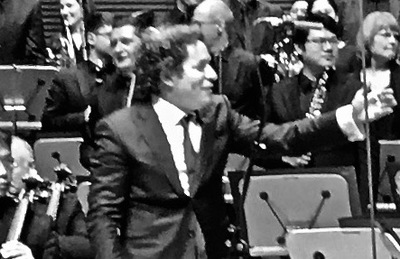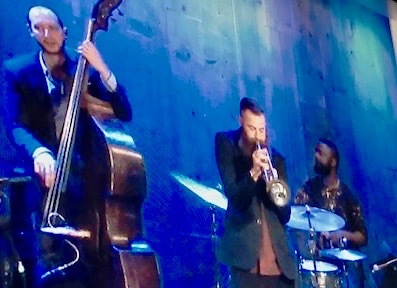Dudamel conducts John Adams and Mahler at Disney Hall, March 9.
"Must the Devil Have All the Good Tunes?" With this world premiere, composer John Adams stacked his chips against Lucifer's -- not usually a smart idea, but it's working out (for now).
Adams wanted the thing to rock, and it did, as much as a symphony can manage. It started with 32-year-old pianist Yuja Wang assailing an unbluesy blues à la Keith Emerson, and maintained the momentum for a half hour, Wang headbanging, slamming her eyelids and huffing hard through Vegas cop music, crisp dissonances and Jethro Tull gallop. Conductor Gustavo Dudamel put his whole back and his curly flattop into the effort, perfectly balancing his big orchestra's precision against its energy. Wang encored with a passionate baroque-flavored solo eruption, then stepped out and gave us a good squint at her Batman abs. It was big fun, and we were required to suffer little edification. If this be pandering, pander on.
Dudamel finished with Mahler's 1st Symphony (1888), which seemed to narrate the festivities surrounding a fox hunt. There were women in lacy dresses with parasols, pies of all kinds, and ominous speculations about a pudding -- the cook had run short on lard, and bets were being taken on whether it would congeal properly. There was also a disturbance over Zero Mostel, who showed up without an invitation. The fox was queried, "Are You Sleeping, Brother John," in a minor key, but no, it was dead, and everyone cheered, because killing it was the whole point; at the end the animal ascended to Fox Heaven. God save.
Little notice was paid to the event's introductory selection, a rhythmless conceptual piece wherein the musicians played seemingly random notes without looking at the conductor. Asked its title, a patron quietly responded, "Tuning Up." Gonna see about downloading that.
Avishai Cohen Quartet at the Blue Whale, March 16.
Not many trumpeters follow Miles Davis down the "Sketches of Spain" road, because that kind of deep lyricism comes from a rare place. But Avishai Cohen is pulling it off.
At the Whale, his tone was soft and quiet, sometimes muted. His lines were mostly spare, but when he played quick, the notes flitted by without a flourish. And always, he felt it.
If Cohen was situating himself around 1960, he had much to live up to: Miles' contemporaneous collaborations with Gil Evans yielded not just "Sketches" but "Kind of Blue," "Miles Ahead," "Porgy and Bess" and "Quiet Nights," and Evans waxed the textural masterpiece "Out of the Cool" in '60. So Cohen needed appropriate help, which he got bigtime. Marcus Gilmore, dancing subliminal polyrhythms around his drum kit with fuzzy mallets, had plainly absorbed the lessons of Elvin Jones, who played percussion on Miles' "Sketches" as well as chthonic drums on Davis' 1955 "Blue Moods" and Evans' 1964 "Individualism." And pianist Fabian Almazan embodied some of the sensitivity and spatial awareness Bill Evans showed on "Kind of Blue," his prodding solos natural extensions of the compositions' open harmonic feel.
With rope-thin Barak Mori limiting his standup-bass lines to the most elemental framework, the whole quartet eased into an atmosphere of elevated concentration where a generous group mind prevailed. And they told stories, notably in a long piece about Cohen's father, whom we could feel living an engaged life, struggling with a final illness, breathing a last breath and merging with the universe. Although Miles was always universal, he was rarely that personal, and the attention of the audience showed we appreciated not just the inspiration, but the connection.
* * *
PHOTOS BY FUZZY BEARD.


